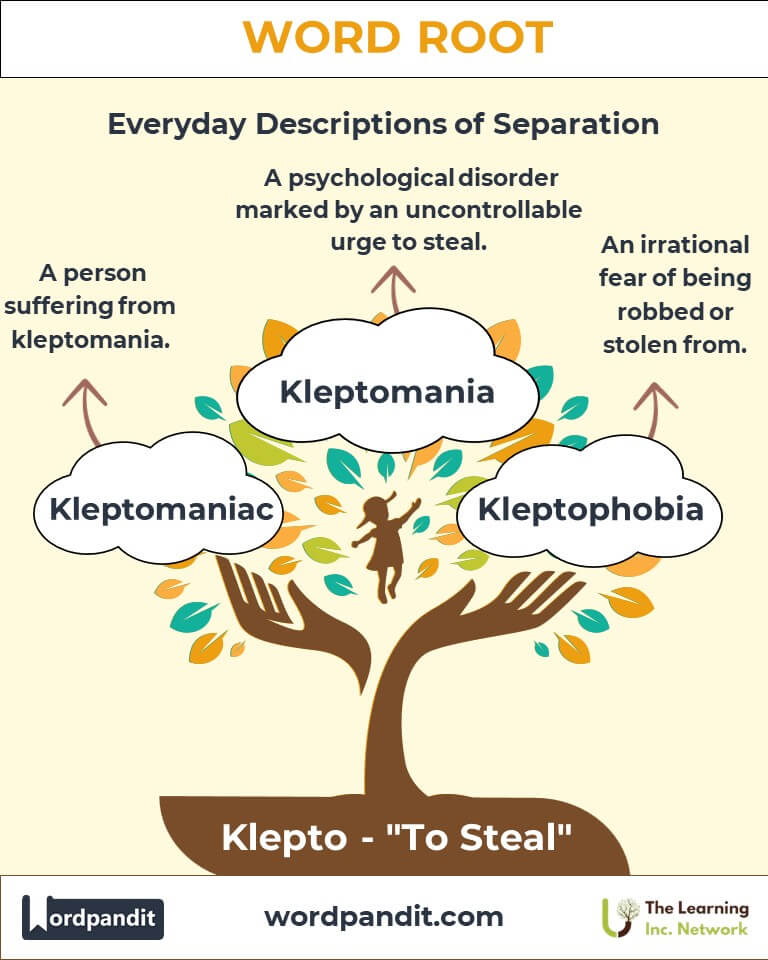Klepto: The Art of Stealing Words in Language
Discover the fascinating linguistic journey of "Klepto," a root derived from Greek, meaning "to steal." From the psychological term "kleptomania" to the political critique of "kleptocracy," this root unveils intriguing aspects of human behavior and societal structures.

Table of Contents
- Introduction: The Essence of "Klepto"
- Etymology and Historical Journey
- Mnemonic: Unlocking the Power of "Klepto"
- Common "Klepto"-Related Terms
- "Klepto" Through Time
- "Klepto" in Specialized Fields
- Illustrative Story: "Klepto" in Action
- Cultural Significance of "Klepto"
- The "Klepto" Family Tree
- FAQs About the "Klepto" Word Root
- Test Your Knowledge: "Klepto" Mastery Quiz
- Conclusion: The Legacy of "Klepto"
1. Introduction: The Essence of "Klepto"
Ever wondered why certain words evoke images of theft, greed, or obsession? The root "klepto," pronounced klep-toh, stems from the Greek word kleptein, meaning "to steal." Its applications span psychology, governance, and literature, encapsulating themes of uncontrollable desire and corruption.

2. Etymology and Historical Journey
"Klepto" finds its origins in Ancient Greek, where kleptein described acts of theft. Over centuries, it entered English, often as part of psychological and political terminology. The term "kleptomania," for instance, emerged in the 19th century to describe a compulsive urge to steal, shedding light on a misunderstood psychological disorder.
3. Mnemonic: Unlocking the Power of "Klepto"
Imagine a mischievous crow with a shiny trinket in its beak, representing the instinctive urge to "take."
Mnemonic Device: "Klepto steals your focus, from trinkets to treasures!"
4. Common "Klepto"-Related Terms
- Kleptomania (klep-toh-may-nee-uh): A psychological disorder characterized by an uncontrollable urge to steal.
Example: "The kleptomaniac sought help after years of taking items she didn't need." - Kleptocracy (klep-tok-ruh-see): A government characterized by corruption and theft of public resources.
Example: "The regime was accused of running a kleptocracy, enriching itself at the expense of the nation." - Kleptomaniac (klep-toh-may-nee-ak): A person suffering from kleptomania.
Example: "He was labeled a kleptomaniac after multiple petty thefts." - Kleptophobia (klep-toh-foh-bee-uh): An irrational fear of being robbed or stolen from.
Example: "Her kleptophobia led her to install multiple locks on every door."
5. "Klepto" Through Time
- Kleptomania (19th Century): Initially seen as a crime, kleptomania later became recognized as a psychological disorder.
- Kleptocracy (Modern Usage): Popularized in political discourse to critique corrupt governments.
6. "Klepto" in Specialized Fields
- Psychology: Kleptomania: Understanding and treating compulsive stealing.
- Politics: Kleptocracy: Analyzing corrupt governance systems.
- Literature: Symbolic use of theft to explore moral or existential dilemmas.
7. Illustrative Story: "Klepto" in Action
Elena, a detective investigating a kleptocracy scandal, faced a unique challenge. Her team uncovered evidence of embezzlement but also encountered a kleptomaniac whose actions complicated the case. Ultimately, Elena’s understanding of "klepto" nuances helped unravel the corruption, highlighting the root's dual relevance in psychology and politics.
8. Cultural Significance of "Klepto"
The "klepto" root embodies societal fears of theft and greed. From myths of trickster gods to modern critiques of political corruption, it resonates deeply in cultural narratives.

9. The "Klepto" Family Tree
- Latro- (Thief):
- Larceny: Theft of personal property.
- Rap- (To Snatch):
- Rapacious: Aggressively greedy.
- Clepto- (Steal, Latinized Variant):
- Cleptology: Hypothetical study of theft behaviors.
FAQs About the Klepto Word Root
Q: What does "Klepto" mean?
A: "Klepto" comes from the Greek word kleptein, meaning "to steal." It is the root of words that describe theft or uncontrollable urges to take something, such as "kleptomania" and "kleptocracy."
Q: What is kleptomania?
A: Kleptomania is a psychological disorder characterized by an irresistible urge to steal items, often without practical need or monetary motive. It is typically triggered by emotional stress or anxiety.
Q: What is a kleptocracy?
A: A kleptocracy is a corrupt government system where leaders exploit public resources for personal gain. It contrasts with democratic or fair systems of governance and often leads to societal decline.
Q: How is kleptomania different from typical theft?
A: Kleptomania is driven by psychological impulses, not intent, while typical theft is intentional and planned for monetary gain. Kleptomania often involves guilt and lack of control, whereas theft is premeditated.
Q: What is kleptophobia?
A: Kleptophobia is the irrational fear of theft or being robbed. It contrasts with kleptomania, which involves a compulsion to steal rather than a fear of theft.
Test Your Knowledge: Klepto Mastery Quiz
1. What does "Klepto" signify?
2. What is a kleptocracy?
3. Who is a kleptomaniac?
4. How is kleptomania different from typical theft?
5. What is kleptophobia?
12. Conclusion: The Legacy of "Klepto"
The root "klepto" offers a lens to understand human behaviors and societal flaws. Whether in psychological conditions like kleptomania or systemic issues like kleptocracy, it underscores the complexities of desire and corruption. Exploring "klepto" inspires a deeper look into how language reflects our struggles and aspirations.












